Introduction to The Holy Quran: The Word of Allah (God)
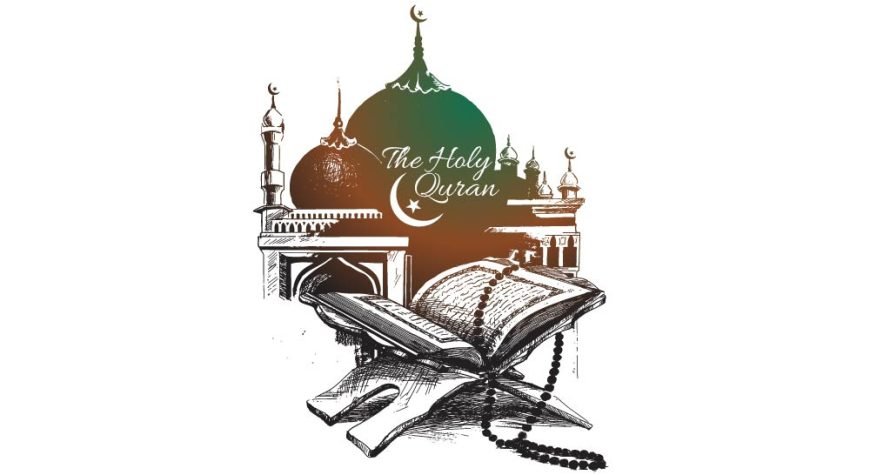
The Holy Quran: The Pillar of Islamic Faith
The Quran, also known as Al Quran or the Koran, serves as the holy book of Islam, the centerpiece of faith and spirituality for over a billion Muslims worldwide. This holy scripture carries an ocean of wisdom, offering divine guidance on every facet of life.
Understanding The Holy Quran: An Overview
Definition and Importance
The Quran, often referred to as the Holy Quran, is the divine scripture central to the religion of Islam. Muslims believe it to be the verbatim word of Allah (God) as revealed to the Prophet Muhammad (ﷺ). This book, consisting of 114 chapters (surahs), and almost 6,236 verses (ayahs), provides comprehensive guidance for Muslims. Its teachings traverse various aspects of life, including spirituality, morality, law, and social behavior, making it a fundamental pillar of the Islamic faith. In the words of Allah from the Quran,
This is the Book about which there is no doubt, a guidance for those conscious of Allah.
(Quran 2:2)
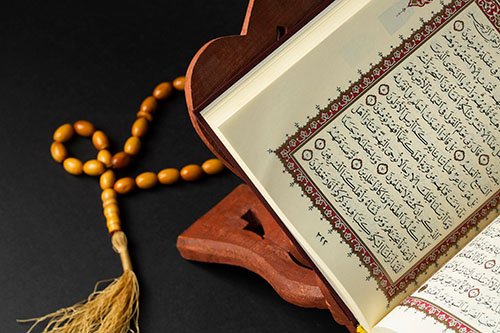
The Holy Quran
The Quran’s Revelation and Compilation
The Quran was revealed to Prophet Muhammad (ﷺ) over a span of 23 years, starting in 610 AD and concluding in 632 AD, the year of his death. These revelations, believed to have been communicated by the angel Gabriel, form the crux of the Quranic text. The compilation of the Quran into a single book, known as mushaf, took place under the Caliphate of Uthman ibn Affan, approximately two decades after the Prophet’s death.
The Language and Style of the Quran
The Quran is written in classical Arabic, regarded as the purest form of the language. The use of Arabic not only reflects the cultural context of its revelation but is also considered a miraculous aspect of the Quran, showcasing the linguistic depth and unmatched poetic elegance. Verses in the Quran often feature a unique blend of metaphor, allegory, and historical reference, resulting in a rich and layered text.
Holy Quran and the Prophethood of Muhammad (ﷺ)
The Holy Quran’s revelation marked the establishment of Prophet Muhammad’s (ﷺ) prophethood and the onset of Islam as a religious faith. Muhammad (ﷺ), often referred to as the Seal of the Prophets, is deemed the last in a line of Prophets that includes Abraham, Moses, and Jesus. Each of these Prophets, while recognized and honored in Islam, is considered to have brought teachings specific to their time and people. In contrast, the teachings of the Quran revealed through Prophet Muhammad (ﷺ), are deemed universal and timeless.
The Quran’s Purpose and Audience
While the Quran was initially addressed to the Arab society of the 7th century, its message is considered universal, transcending cultural, racial, and temporal boundaries. The teachings of the Quran aim to guide individuals towards moral and spiritual excellence, and societies towards justice, compassion, and mutual respect. It speaks to all aspects of the human experience, addressing the heart and the intellect, the individual and the community, the spiritual and the practical.
Through this overview, it becomes clear why the Quran is highly revered in the Muslim world. It serves as more than just a religious text; it is a guide for life, a source of comfort, and an inexhaustible well of spiritual wisdom.
Structure of The Holy Quran
The Holy Quran stands out not only for its profound teachings but also for its unique and meticulous structure. A comprehension of this structure is crucial for understanding the text in its entirety.
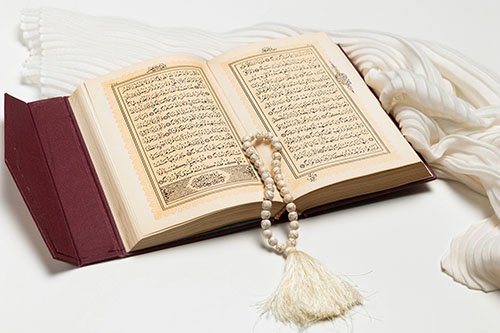
Structure of The Holy Quran
Chapters and Verses: What is Surah?
The Quran is organized into chapters and verses, known as Surahs and Ayahs, respectively. A Surah serves as a separate unit within the Quran, each carrying a specific theme or set of interrelated themes. The Quran contains 114 Surahs, with their lengths varying widely. The longest is Al-Baqarah (Arabic: البقرة) with 286 verses, and the shortest, Al-Kawthar (Arabic: اَلْكَوْثَر), comprises only three verses. Interestingly, the Quran’s Surahs are not arranged by length or chronology of revelation but are organized in a specific order believed to be divinely inspired.
The Unique Order and Sequence in the Quran
One may wonder why the Surahs in the Quran are not arranged chronologically according to their revelation or based on their length. The order of Surahs in the Quran follows a divine arrangement that was instructed by the Prophet Muhammad (ﷺ) under the guidance of the angel Gabriel. This order begins with Al-Fatiha (The Opening) and concludes with Al-Nas (The People). Each Surah, regardless of its placement, contributes to the Quran’s overall message, creating a cohesive spiritual narrative.
Distinct Themes and Messages in Each Surah
Each Surah in the Quran carries its unique message and theme. For instance, Al-Baqarah deals extensively with the challenges of forming an Islamic community, An-Nisa addresses family matters and women’s rights, and Al-Mulk highlights the transient nature of life and the reality of the afterlife. This thematic diversity in the Surahs allows the Quran to offer guidance on a vast range of life’s facets.
Divisions for Recitation: Hizb and Juz
For ease of recitation and to facilitate the memorization of the Quran, it has been divided into smaller sections known as Hizb and Juz. The Quran contains 30 Juz and 60 Hizb. This division does not necessarily coincide with the beginning or end of a Surah but often falls within a Surah, providing a manageable scheme for those aiming to complete the Quran’s recitation in a month, especially during Ramadan.
The Quran: An Unchanging Divine Revelation
A key aspect of the Quran’s structure that sets it apart from many other religious texts is its unchanging nature. Since its initial revelation in the 7th century, the Quranic text has remained untouched and unaltered, a testament to its divine origin and authenticity. This immutability underscores the belief that the Quran is the final and perfect word of God, as is evidenced in the verse,
Indeed, it is We who sent down the message [i.e., the Qur’ān], and indeed, We will be its guardian.
(Quran 15:9)
Understanding the structure of the Quran helps readers appreciate its coherence, thematic depth, and the divine wisdom it encapsulates. It brings to light the Quran’s comprehensive guidance, making it a source of spiritual enlightenment for all Momins (True Muslims).
Holy Quran and Islamic Law: Introduction to Islamic Law
The Basis of Islamic Law: The Quran and the Sunnah
Islamic law (Sharia), finds its roots in two primary sources: the Holy Quran and the Sunnah of Prophet Muhammad (ﷺ). The Quran, being the divine revelation from Allah, holds the highest authority in shaping Islamic law. Meanwhile, the Sunnah—comprising the practices, sayings, and approvals of Prophet Muhammad (ﷺ)—serves as the practical interpretation and application of Quranic principles.

Islamic law (Sharia)
Understanding the Quranic Law
The Quran is not a law book in the conventional sense; rather, it is a guide for personal development and social reform. It does, however, lay down a legal framework for a just society. Quranic law addresses various aspects of life, including marriage and divorce, inheritance, criminal justice, and financial transactions, among others. Its purpose is to ensure justice, protect human rights, uphold moral values, and establish social harmony.
Examples of Quranic Laws
For instance, the Quran instructs on matters of economic justice and prohibits usury (riba), as stated in the verse
Allah has permitted trade and has forbidden interest
(Quran 2:275).
The Quran also emphasizes the sanctity of life, as expressed in
…whoever kills a soul unless for a soul1 or for corruption [done] in the land – it is as if he had slain mankind entirely. And whoever saves one – it is as if he had saved mankind entirely.
(Quran 5:32).
The Sunnah in Islamic Law
The Sunnah complements the legal teachings in the Quran by providing practical examples of how these teachings were applied in the Prophet’s life. The Hadiths (recorded sayings or actions of the Prophet) provide details about practices such as the method of prayer, rites of pilgrimage, and details about charity (zakat) which are not fully covered in the Quran.
Islamic Law: Adaptable and Dynamic
Islamic law is dynamic and adaptable, designed to cater to the needs of different times, places, and cultures, while always adhering to the immutable principles laid down in the Quran. Jurists and scholars engage in ijtihad (independent legal reasoning) and tafsir (exegesis) to interpret the Quran and Sunnah in light of contemporary issues.
In essence, the Quran, along with the Sunnah, forms a comprehensive legal and moral code that guides Muslims in all aspects of life. It emphasizes justice, mercy, and the betterment of society, making it a beacon of guidance for Muslims worldwide.
Quranic Teachings and Interpretation: Introduction to Tajweed and Tafsir
The Art of Tajweed: Preserving the Pronunciation of the Quran
Tajweed in Arabic means to improve or to do better. In the context of Quranic recitation, it refers to the set of rules that govern the pronunciation of Arabic letters and words. It is an essential aspect of Quranic study, aimed at preserving the original sounds of the Quran as it was revealed to Prophet Muhammad (ﷺ).
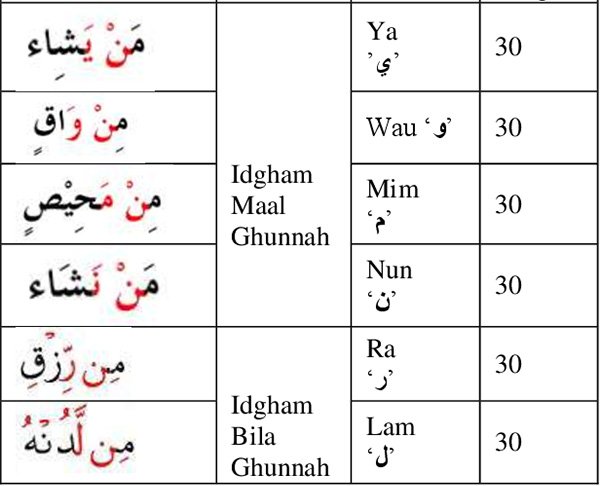
Tajweed
Every letter in the Arabic language has a unique point of articulation and characteristics. Tajweed teaches these precise articulatory aspects, ensuring the correct pronunciation of the Quranic text. It also includes guidelines about the rhythm and melody (ghunnah) to be maintained while reciting. It’s important to note that the rules of Tajweed must be learned under the guidance of a competent teacher, due to the complexities involved.
The Significance of Tafsir: Interpreting Holy Quran
While Tajweed pertains to the correct recitation of the Quran, Tafsir refers to its interpretation and explanation. The purpose of Tafsir is to gain a deep understanding of the Quranic verses, their historical context, and their relevance to contemporary life. This in-depth study allows Muslims to derive meaningful insights and practical applications from the Holy Quran.
Tafsir combines knowledge from various disciplines such as linguistics, jurisprudence, and history. This helps in understanding the literal meanings of words, the context in which verses were revealed, and the ways in which Prophet Muhammad (ﷺ) and his companions interpreted and applied them.
Types of Tafsir
There are different types of Tafsir, each with its own approach. Some scholars focus on linguistic analysis (Tafsir bil-lughah), others use Hadiths to explain the verses (Tafsir bil-hadith), and some use reason and intellect (Tafsir bil-ra’y). There are also scholars who use a combination of these approaches to provide a comprehensive explanation.
The Importance of Tafsir and Tajweed in Quranic Study
Tajweed and Tafsir are critical to the study of the Quran. Tajweed ensures the accurate oral transmission of the Quranic text from generation to generation, while Tafsir ensures its correct understanding and interpretation. Both are essential for a comprehensive grasp of the Quran’s teachings, promoting a holistic understanding of the Quran’s divine wisdom.
In essence, the mastery of Tajweed and an understanding of Tafsir are crucial for any Momin (true Muslim) who wishes to connect deeply with the teachings of the Holy Quran and apply them in daily life. They form the bedrock for an enriching Quranic study experience, allowing for a deeper and more nuanced understanding of Islam’s holy scripture.
The Quran’s Impact and Influence on Society
The Role of the Holy Quran in Shaping Morality and Ethics
A crucial facet of the Quran’s societal influence lies in its comprehensive ethical framework. The Quran provides a moral compass for Muslims, guiding not only personal conduct but also communal relationships and societal responsibilities. The verse,
Indeed, Allāh orders justice and good conduct…
(Quran 16:90)
,exemplifies this ethic, endorsing a code of morality that profoundly influences every sphere of a believer’s life.
Quranic Influence on Laws and Governance
The Quran’s principles form the bedrock of Islamic jurisprudence and governance. Its teachings offer directives on various aspects of public administration, justice, and human rights. By advocating for equality, social justice, and ethical leadership, the Quran has significantly influenced political systems and laws in various Islamic societies.
The Quran’s Role in Promoting Social Welfare and Charity
The Quran places considerable emphasis on social responsibility, charity, and care for the underprivileged. It obliges believers to support those in need and to strive for socioeconomic equity in society. This has fostered a strong culture of philanthropy and welfare in Muslim communities worldwide.
The Quran and the Sciences: Knowledge and Discovery
Interestingly, the Quran’s influence extends beyond the spiritual and moral domain to the realm of knowledge and discovery. Despite being primarily a spiritual text, the Quran refers to various natural phenomena, some of which resonate remarkably with contemporary scientific understanding. This overlap underscores the harmony between faith and reason in the Islamic worldview and promotes intellectual curiosity among its followers.
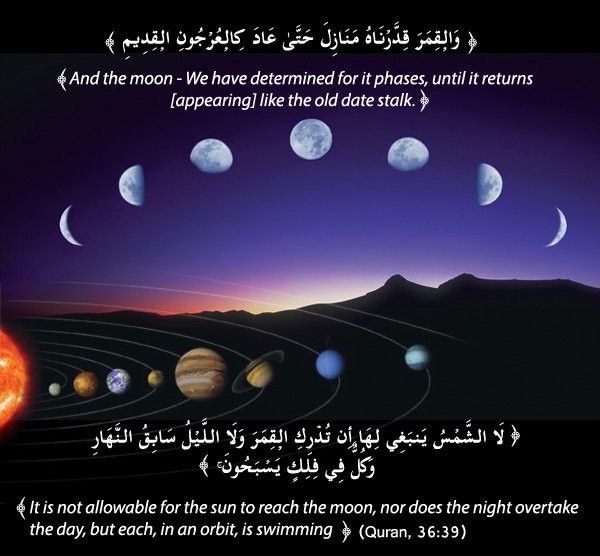
The Holy Quran and the Science
The Quran: A Living Guide for Momins (True Muslims)
The Quran, as the final holy book revealed by God, serves as an eternal guide for all Momins. Its timeless wisdom invites believers to lead a life of righteousness and piety. The Quran fosters spiritual growth, moral uprightness, and intellectual exploration, making it a beacon of guidance for those in pursuit of inner peace and eternal success.
Epilogue: Embracing the Wisdom of the Quran
The Quran, the holy book of Islam, stands as a testament to divine wisdom and guidance. It offers invaluable lessons and a spiritual roadmap to all Momins (true Muslims), shaping our perspective on life, faith, and humanity. By enriching our understanding of spirituality and the universe, it encourages us to lead a balanced life, promoting both personal growth and societal well-being. The journey towards comprehending the Quran is continuous, and each step in this journey opens new doors of wisdom and enlightenment.
Frequently Asked Questions
- What is the Quran?
The Quran is the holy book of Islam, believed to be the word of God as revealed to the Prophet Muhammad through the Angel Gabriel. It serves as a guide for all aspects of life for Muslims worldwide. - What is the structure of the Quran?
The Quran is composed of 114 chapters, or Surahs, each varying in length. The Surahs are classified as Meccan or Medinan, depending on whether they were revealed before or after the migration of Prophet Muhammad to Medina. - What is Tajweed in the context of the Quran?
Tajweed is the set of rules governing the pronunciation and recitation of the Quran. It ensures that the Quran is read in the manner it was revealed, enhancing the beauty and impact of its recitation. - What is Tafsir and why is it important?
Tafsir is the process of interpreting and understanding the Quran. It is vital for extracting the teachings and laws from the Quranic verses and applying them in various life contexts. - How does the Quran impact society and Muslims?
The Quran influences societal laws, morality, and ethics. It encourages social responsibility, charity, and learning, shaping the lives of millions of Muslims worldwide.
Lorem Ipsum


4 comments
Ethics of War in Islam: A True Guide for Momins
January 20, 2024 AT 4:52 pm[…] Holy Quran, revealed during this period, provided foundational guidelines for engaging in conflict. Verses […]
Tawhid: Unveiling Divine Oneness of Allah (Complete Insight)
January 26, 2024 AT 6:02 pm[…] to Islamic belief, emphasizes the uniqueness and singularity of Allah (اللّٰه). The Quran, Islam’s holy book, is replete with verses that highlight this principle. A quintessential example […]
Creation of the Universe in Quran: (We are [its] expander)
January 31, 2024 AT 6:20 am[…] centers profoundly around Allah (اللّٰه), revered as the omnipotent and omniscient. The Quran, Islam’s holy scripture, elucidates this in numerous verses, with a prominent example […]
What Exactly is Islam? A Comprehensive Guide [2023 Update]
February 1, 2024 AT 5:37 am[…] as Islam, emphasizing the act of voluntary submission to God’s commandments. Muslims around the globe strive to live lives of peace, harmony, and submission, guided by the Holy Quran and the life of the Prophet Muhammad (ﷺ). In the words of the Quran, “And who is better in […]